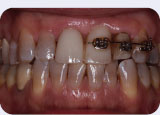
Rehabilitation of anterior teeth requiring orthodontic extrusion
CASE STORY
A 48-year-old female patient presents with a carious left lateral incisor (10); she requests extraction and placement of a single-unit implant and restoration. The patient reports that this was the treatment prescribed by her previous dentist. The patient presents with a restoration on the left central incisor with a cantilever unit for the lateral incisor serving as a provisional restoration. The lateral incisor is carious and has no remaining tooth structure above the gingival margin. After thorough clinical and radiographic examination, an alternative treatment option was presented to the patient: orthodontic extrusion of the lateral incisor and restoration of the tooth with a conventional crown.
Figure 1: Pretreatment presentation.

Figure 2: Orthodontic treatment.

Figure 3: Posttreatment presentation.

LEARNING GOALS AND OBJECTIVES
- I ndications and contraindications of orthodontic extrusion
- Site development for future implant placement
Medical History
- No significant medical history reported
Dental History
- Multiple direct restorations
- Trauma in the anterior maxilla 23 years ago
Medications and Allergies
- No medications
- No known drug allergies
Review of Systems
- Vital signs:
- Blood pressure: 120/80
- Heart rate: 80 beats/minute
- Respiration rate: 16 breaths/minute
Social History
- No significant findings
- Significant Soft Tissue
Examination Findings
- No significant findings
Significant Clinical Findings/Problem List
- Fracture of coronal tooth structure maxillary left lateral incisor
- Caries maxillary left lateral incisor
- Provisional restoration maxillary left central and lateral incisors (9 and 10)
Diagnosis
- Caries
- Inadequate coronal tooth structure
Clinical Decision-Making Determining Factors
- The lack of crown height may be due to a number of different clinical situations such as fracture of the tooth, caries, and previous excessive tooth preparation. Increase of clinical crown height may be achieved through periodontal surgery (i.e., crown-lengthening procedures) or via orthodontic extrusion of the tooth.
- In certain clinical situations, crown lengthening may be contraindicated. For example, osseous recontouring of the tooth in question may lead to an unfavorable crown-to-root ratio, an aesthetic compromise, or scar tissue formation after surgery. In such situations, orthodontic extrusion may be indicated (Potashnick and Rosenberg 1982).
- Orthodontic extrusion involves vertical forced movement of a tooth, which in turn stimulates apposition of crestal bone. The gingiva and alveolar bone move vertically along with />
Stay updated, free dental videos. Join our Telegram channel

VIDEdental - Online dental courses


